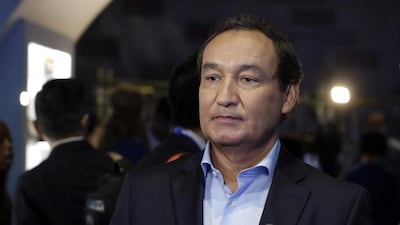The United Airlines chief executive Oscar Munoz has said he will not resign and again apologised for the brutal removal of an elderly customer from an overbooked flight – an incident that drew global scorn.
“I was hired to make United better and we’ve been doing that and that’s what I’ll continue to do,” Mr Munoz said, when asked about calls for his resignation as the leader of the embattled airline.
He reiterated his regret over the incident on Sunday, which sparked widespread outrage and mushroomed into a global public relations disaster after video of the passenger Dr David Dao, 69, his face bloodied, being dragged off the plane, went viral. Demonstrations also took place at several airports, some protesters carrying placards reading “unfriendly skies” in reference to the airline’s advertising motto “Friendly skies”.
United also said it would compensate all passengers on Dr Dao’s flight.
“Probably the word ‘shame’ comes to mind,” Mr Munoz said, adding that he had not yet spoken to Mr Dao, but his team had tried to reach out to him.
“We’ve not been able to contact him directly,” Mr Munoz said. “I do look forward to a time when I can as much as I’m able to apologise directly to him for what’s happened.”
Talking to Dr Dao may now prove difficult. Just as United made the refund announcement, Dr Dao reportedly filed an “emergency bill of discovery” against United and the City of Chicago over the incident. The bill is asking for the preservation of evidence including surveillance and cockpit recordings as well as the passenger list.
While this bill itself is not an official lawsuit filing, it’s the first step towards Dao’s determination regarding one.
But even with the federal government and a senate committee looking into the incident, the airline industry is beginning to speak up against any effort to bar them from overselling flights.
The chief executive of Delta Air Lines called overbooking “a valid business process”.
“I don’t think we need to have additional legislation to try to control how the airlines run their businesses,” said Ed Bastian. “The key is managing it before you get to the boarding process.”
Federal rules allow airlines to sell more tickets than they have seats, and airlines do it routinely because they assume some passengers will not show up.
The practice lets airlines keep fares low while managing the rate of no-shows on any particular route, said Vaughn Jennings, a spokesman for Airlines for America, which represents most of the big US carriers. He said that plane seats are perishable commodities – once the door has been closed, seats on a flight cannot be sold and lose all value.
“Bumping”, as it is called, is rare – only about one in 16,000 passengers in the US got bumped last year, the lowest rate since at least the mid-1990s. But it angers and frustrates customers who see their travel plans wrecked in an instant.
Bumping is not limited to flights that are oversold. It can happen if the plane is overweight or air marshals need a seat. Sometimes it happens because the airline needs room for employees who are commuting to work on another flight – that is what happened Sunday on United Express.
Flight 3411 was sold out – passengers had boarded, and every seat was filled – when the airline discovered that it needed to find room for four crew members.
That eventually led to the video it seems everybody has seen – a pensioner forcibly dragged off the plane by security officers after refusing to give up his seat.
* Agencies
business@thenational.ae
Follow The National's Business section on Twitter

